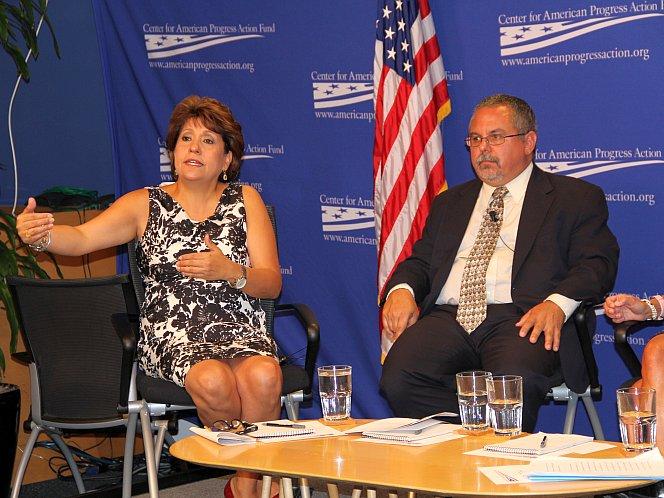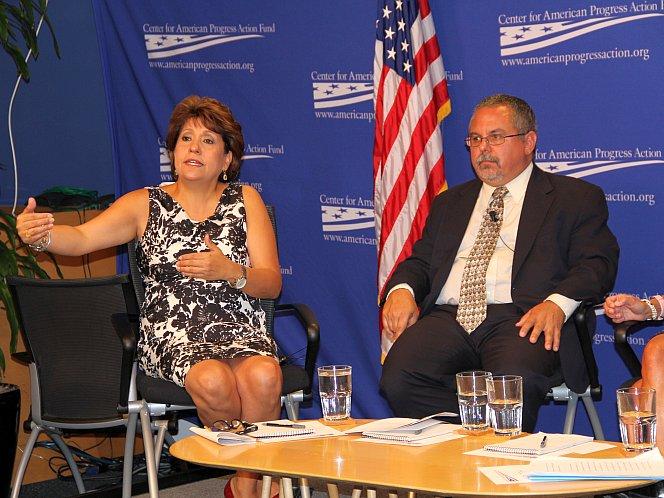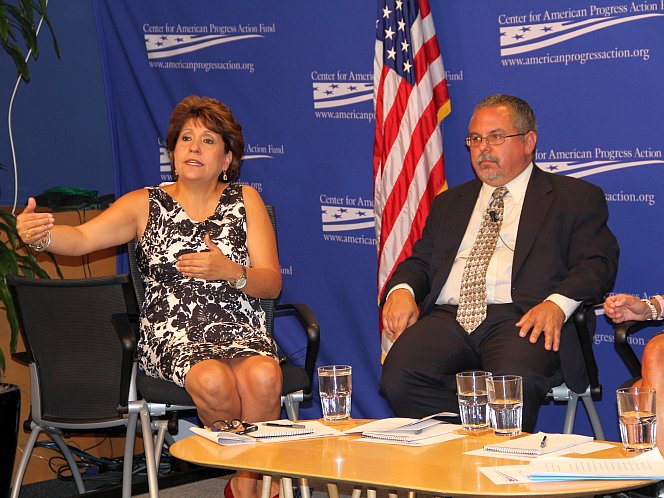WASHINGTON—Presidential candidates are reaching out to the Latino community, yet Latino leaders say their communities should not wait for politicians and should become more proactive in civil society.
Janet Murguía, CEO of La Raza, the largest Latino civil rights organization in the United States, says that for too long the Latino community has sat back and waited for others to champion their cause. Now, with a lack immigration reform, a stalled Dream Act that would create a path to citizenship for some young illegal immigrants, and controversial state immigration laws, it is time “to exercise some responsibility.”
“The paths to see these reforms will be through our civic engagement,” she told a forum at the Center of American Progress (CAP) in Washington, D.C., on July 19.
As part of that engagement, Murguía encouraged Latinos to register to vote so they could select the politician who would best express Latino views. She also warned the community that it was not effective to just step up every four years for an election and then drop out of sight again.
“We have to understand that the day after Election Day we need to continue to stay involved,” she said. That civic participation “has to be part of our culture now,” she added.
Hispanics are the largest and fastest-growing ethnic minority in the United States, with around one-sixth of Americans claiming Hispanic heritage, according U.S. Census Bureau data. By 2050, one-third of Americans will be of Hispanic origin.
Election Impact
Latinos have become increasingly important players in general elections. This year they could determine the outcome in 10 of the key battleground states, including Colorado, New Mexico, Arizona, Nevada, and Florida, says Philip Wolgin, immigration policy analyst with CAP.
There are 12.1 million unregistered, but potentially eligible, Latino voters across those 10 states, he said.
Both President Obama and presumptive Republican presidential nominee Mitt Romney have been trying to woo the Latino vote. Obama hopes to reclaim the support from the Hispanic community that helped him over the line in 2008, while Romney hopes to recover support for the GOP after touting harsh initiatives to deal with undocumented immigrants during the primaries.
Both candidates have turned to Spanish-language advertising. The Romney campaign released its ninth Spanish-language TV ad since January 2012, the latest on his campaign website, titled “País de Inmigrantes,” a country of immigrants. Obama is using both TV and radio advertising, revitalizing his 2008 ad campaign “Si, se puede,” or “Yes, we can.”
According to the Pew Hispanic Center, Obama garnered 67 percent of the Hispanic vote in the last general election.
Bipartisan Issue
Obama presently leads in the polls by a large margin among registered Latino voters. An NBC-Wall Street Journal-Telemundo poll, released Wednesday, put him ahead of Romney by 43 points, 67 percent to 23 percent.
Latino pollsters, Latino Decisions, put Obama at a 70 percent lead.
“That is something of a milestone,” said Gary Segura, co-founder of Latino Decisions, and professor of political science and chair of the Chicana/o Studies at Stanford University. “The trend over the last 20 months has been steady improvement for the president, and more or less stasis for the Republican nominee.”
Segura, who was speaking at the CAP forum, said that trend could well change. He noted polls from the year before that had Republicans in the lead and Obama trailing, a result of disillusionment in the Hispanic community over promised immigration reform and the administration’s heavy-handed deportation strategy.
Over 400,000 Latinos have been deported during the last fiscal year alone, “a crazy high number,” Segura said. According to his research, 25 percent of Latinos know someone who has been deported.
Obama’s rise in the polls has been credited to his executive order halting the deportation of illegal immigrants brought to the United States as children.
Segura said Republicans are unlikely to improve their standing among Latinos until they “change the dialogue with the Latino community.” He pointed to a lack of leadership saying, “There needs to be a Republican leader to take up that issue.”
As for leadership, Murguía suggested Florida Sen. Marco Rubio, who was born in Cuba. Although she did not agree with everything he proposed, she believes he has been “a voice of reason” for the Republican Party.
Rubio is one of the Republicans Mitt Romney is considering for the role of vice president.
Murguía said the Latin community had to appeal to both parties, since immigration is a bipartisan issue, and as such could only be resolved with bipartisan agreement.
The Epoch Times publishes in 35 countries and in 19 languages. Subscribe to our e-newsletter.






